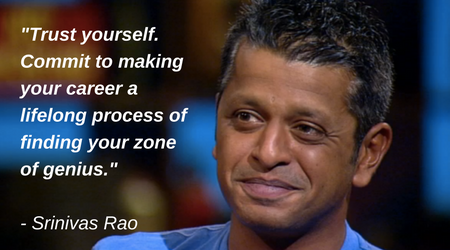Srinivas Rao, the host of the Unmistakable Creative podcast and author of the best-selling book Unmistakable: Why Only Is Better Than Best, recently wrote a blog post that describes six ways you can grow your “zone of genius.”
About this concept, he wrote: “There are moments in all of our lives when we feel as if we are doing exactly what we were born to do. Our work feels like a privilege and everything we’re doing feels like a gift to the world.” He then outlines 6 ways to uncover this ideal creative flow state.
But Srini has only scratched the surface of what you need to know about these half-dozen creativity strategies. So I’m using his thoughts as a jumping off point to do a deeper explore on each of them.
My goal is to inspire you by what’s possible and to persuade you to take action and expand your own zone of genius. You’ll be glad you did!
1. Set aside time for reflection each day
 What Srini says: “Setting aside time for self-reflection helps us cultivate the discipline that allows us to tap into our personal zone of genius.”
What Srini says: “Setting aside time for self-reflection helps us cultivate the discipline that allows us to tap into our personal zone of genius.”
My thoughts: Yes, this is quite true. But Srini doesn’t really explain HOW this works. Disengaging our conscious brain, which tends to get locked into a bias for action, opens up access to your subconscious mind. That allows ideas and hunches to bubble up. For most people, any activity where you’re relaxed and can allow your mind to wander can be prime time for your creative genius.
Since you don’t know where or when inspiration may strike, I strongly recommend that you carry a tool around with you at all times to capture your ideas before they disappear once again into the depths of your subconscious mind. I’ve written about this topic extensively, here, here and here.
Also, setting aside time for relaxation also gives you an opportunity to process:
- What you’ve learned, heard, and stimuli we’ve encountered.
- What does it mean?
- How can I use or adapt it?
- How does this new information connect with what I know?
- Does it challenge my assumptions?
If so, what do I need to reconsider?
Try to cultivate quiet, meditative time during your day. You don’t need to be listening to music on your smart phone, checking email or looking at the latest developments on Facebook every minute of every day. if you do so, you’re now allowing your genius to emerge.
Just disconnect, relax and let your brain adopt a quieter state.
2. Conduct lots of experiments and collect data points
What Srini says: “Experimentation is essential for innovation and creativity… A well-designed experiment shouldn’t cost much in terms of time and money, gives you quick feedback and enables you to iterate.”
My thoughts: Thomas Edison once said there are no failures, only outcomes. Each experiment produces data, insights and an expanded perspective that we can use to iterate our way to a workable solution.
Let’s say, for example, that you’re thinking of changing careers. You wouldn’t make this move all in one gigantic step. You would start by conducting research about the field you want to work in. You’d meet with people already doing that type of work to learn more about its pros and cons. With each step, you would learn more about your potential next step, and where the real opportunities are. Frequently, this is different than you thought at the beginning of this process.
If you have a new idea that’s potentially valuable, you’ll engage in similar information gathering and experimentation to learn what it’s potential customers really need – versus what you thought they needed.
Is it a messy, non-linear process? Absolutely. But it’s only by trying things and collecting data about the outcomes that we can learn, make adjustments and iterate our way to a workable solution.
3. Work in a Growth Environment and Choose a Great Boss
What Srini says: “Figure out whether your potential boss is a person who will stifle your zone of genius or cause it to emerge. Choose the latter.”
My thoughts: I’ve always had bosses who give me a lot of creative freedom. Even if they had some initial misgivings, they gave me enough rope to let the idea play out, often successfully. They also were supportive of the fact that I had clients outside of work, plus several websites and blogs, where I would experiment continually with different types of content, business models and promotion techniques. They realized that what I learned in my avocation would enhance the value I provided in my vocation.
Related to this idea is the practice of seeking creative work spaces in which you can do your best thinking. In most cases, this ISN’T your office cubicle. With today’s mobile technology, you CAN do genius work anywhere. Take advantage of this opportunity, but make sure you and your boss are in agreement on how your remote working relationship will be set up.
4. Seek Opportunities with Autonomy
What Srini says: “Without autonomy, we tend to lack a greater sense of purpose and meaning in our work, which makes it difficult to tap into our personal zone of genius.”
My thoughts: I promise to deliver a certain end result. The means of getting there should be up to me – with some oversight, of course. But if you give me a strongly prescriptive assignment, I can’t add much value to it. If I get to help shape the project or design part of my position, I can add a lot more value!
Here is where small companies shine. Because there are fewer layers of management and everyone is so busy, I find that I can work with greater autonomy than I would be able to in a large company. Reporting is also more rigorous at a larger company, too. Genius exists more readily in smaller firms.
5. Become a Producer
What Srini says: “Producers create value by bringing new ideas into existence. There’s tangible evidence of their impact. They tend not to thrive in situations where they can’t see evidence of their contributions.”
My reaction: That’s why I’ve always gravitated to smaller organizations. I can produce in my zone of genius without interference. There are bigger opportunities for job design. And the owners of the business usually have an entrepreneurial mindset, which naturally supports creative producers.
For my avocation, I’ve learned that nothing happens until something ships – an article, a promotional email, a new info product. Even though my ability to tweak and improve a piece of content is almost unlimited, I have to put a stake in the ground and say “it’s good enough; it needs to be published now.”
6. Embrace Non-Linear Thinking
What Srini says: “For a person who is creative and can embrace non-linear thinking, there’s probably been no better time in history to be alive. The only question is what you’ll do with what you’ve been given.”
My thoughts: The whole idea behind non-linear thinking is to jump out of your mental comfort zone (you could even say that your comfort zone and your genius zone are mutually exclusive!) and explore new pathways of thinking and new possibilities. As human beings, we tend to be habitual thinkers. Inertia takes over. We stop with the first right answer. We don’t explore outside of our comfort zones. We look for similar challenges from the past that are analogous to our current situation. Left to our own devices, we’re not very good at non-linear thinking!
Fortunately. here are myriad tools and techniques you can employ to help you think in non-linear or lateral ways. From brainstorming card decks and ideation apps to mind mapping software, digital idea capture tools and creative problem solving books that will “whack” your thinking upside the head, you have many options to jump-start your creative muse. In other words, these tools will help you excel at non-linear thinking.
How will you cultivate your zone of genius?
You have complete control over your “zone of genius.” You just need to make a commitment to cultivating, growing and exercising it. Creativity is a skill, not an inborn trait.
Good luck with expanding YOUR zone of genius!

